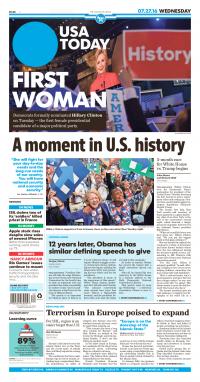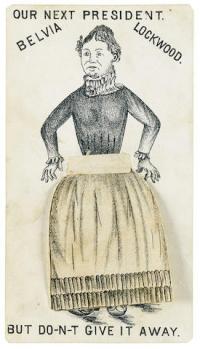Hillary Joins Other Female Firsts in History Books
Hillary Clinton joins two other women in America's history as presidential nominees: Victoria Woodhull and Belva Ann Lockwood.

On an emotional night in Philadelphia, Clinton became the first woman to clinch the nomination from a major political party.
More than 130 years earlier, Woodhull and Lockwood fought similar battles — trying to convince an electorate that a woman was capable of leading a nation. And in Woodhull and Lockwood's cases, neither they nor others of their sex could even vote.
Woodhull is recognized as the first woman nominated for the presidency. She represented the Equal Rights Party, which she formed after splitting from the National Woman Suffrage Association. This was in 1872 and her candidacy drew shock and scorn from the press. And there was the awkward move by the party of nominating abolitionist Frederick Douglass for vice president without asking him; he declined the nomination. Woodhull’s campaign didn't go far.
Lockwood took the bid for the White House to the next level and was the first woman to actively stump for the office, complete with a 12-point platform. During the 1884 campaign season, Lockwood gained national exposure through speeches and appearances at political conventions across the country. The Equal Rights Party nominee won only a few thousand votes on Election Day, but continued her political and legal career. She ran again in the 1888 election, with the same results. See how the media have covered these political pioneers.
Clinton
Click here to view archived front pages from the Democratic National Convention in July. This Newseum story looks at the decision-making process by newspapers on how to play the historic nomination on their front pages.
Woodhull and Lockwood

Woodhull, a suffragist, ran for president in 1872 as the nominee of the Equal Rights Party. The engraving shows Woodhull giving a lecture in Boston. She controversially supported "free love" (love without legal marriage).
Harper's Weekly discusses Woodhull's attempt to vote in New York's fall 1871 elections, and includes an illustration of the event.
The front page of the Colorado State Republic covers Lockwood’s serious bid for the presidency in 1884.
A newspaper printed on cloth celebrates the election of President Grover Cleveland, and mocks his opponents, including female candidate Lockwood.
A Puck magazine cartoon from Nov. 5, 1884, shows an apparently dejected Lockwood after losing to Cleveland.
NewseumED is excited about its newest Lockwood acquisition — a 4 7/8 x 2 1/2 inches satirical card from the 1884 presidential campaign. The memorabilia is captioned "Our Next President. Belvia (sic) Lockwood. But Do-n-t Give It Away."
According to the auction house, Bonhams, "The mechanical card features a caricature of Lockwood in a brown dress which lifts to reveal Benjamin Butler — the Greenback Party candidate for president — hiding beneath. The meaning of this satire is obscure, but perhaps makes reference to Butler's speaking on the floor of Congress in support of Lockwood's 1874 petition to allow women to argue before the Supreme Court."
Find about more about them in our EDCollection "Women, Their Rights and Nothing Less: The First Amendment and the Women's Suffrage Movement." (Registration on the website is required to view some items, but it's free.)